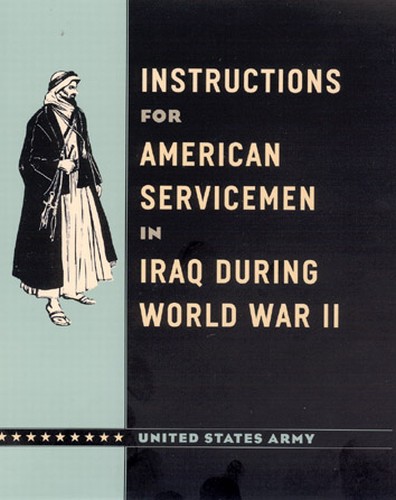Review: United States Army, Instructions for American Servicemen in Iraq

An interesting piece on the United States Army’s recently re-released Instructions for American Servicemen in Iraq during World War II appeared last Tuesday in the “No Comment” section of Harper’s magazine. Pointing out the urgent relevancy of this small handbook more than sixty years after it was originally issued to American servicemen during WWII Harper’s contributor Scott Horton writes:
Those despairing of American policymakers’ mistakes in Iraq (of which there are now so many it’s hard to keep count) may find some solace in this amazing little booklet just out from the University of Chicago Press. It’s 44 pages long, just enough for a commuter’s bus or train ride home, but it’s a treasure chest of information. And the bottom line for the piece couldn’t be clearer: we didn’t used to be so stupid.…
Offering such practical advice as “American success or failure in Iraq may well depend on whether the Iraqis like American soldiers or not,” and “manners are important” this new edition of Instructions for American Servicemen in Iraq should indeed be essential reading for anyone who cares about the future of Iraq and the fate of the American soldiers serving there.
Update: The Chicago Tribune also released an enthusiastic review of the book that made the cover of Tuesday’s paper. Tribune higher education reporter Jodi S. Cohen writes:
The University of Chicago Press has a hot book on its hands, with some solid advice for U.S. military in Iraq: “Make friends with the Iraqis. Stay out of political and religious arguments. Try speaking in Arabic—even if you’re not good at it.…”
The advice, which sounds like it could be lifted from a lesson book from the war on terror, was actually written 65 years ago during World War II and recently discovered by the U. of C. Press. It’s called Instructions for American Servicemen in Iraq During World War II.
The book includes an updated foreword from Lt. Col. John A. Nagl, who served in Iraq with the 1st Brigade of the 1st Infantry Division. He writes about wishing he read the book before going to Iraq’s Al Anbar province in 2003.
“Some of the guidance in this little book is eerie to anyone who has fought in Iraq recently,” he wrote in the introduction. “It is almost impossible, when reading this guide, not to slap oneself on the forehead in despair that the Army knew so much of the Arabic culture and customs, and of the importance of that knowledge for achieving military success in Iraq, six decades ago—and forgot almost all of those lessons in the intervening years.”